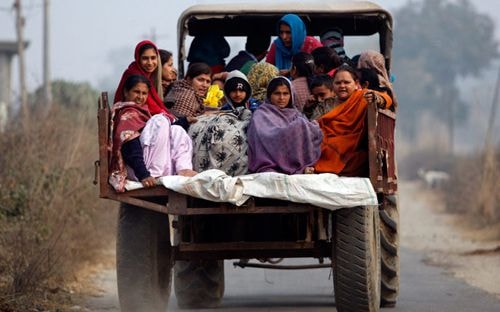India-Pakistan border tensions rise
Public opinion is extremely concerned that these tensions could develop into a full-blown conflict if neither country makes concessions.
Indian and Pakistani troops exchanged artillery fire on January 5 at their shared border, killing four civilians, including a teenager, and a soldier. This was the latest in a series of deadly clashes between the two sides over the past week. The clashes in this area have caused tension in relations between the two countries.
 |
| People in the Kashmir border area have to leave their homes to seek refuge because of fear of bombs and bullets. |
According to Pakistan, shelling from India killed four civilians, including a teenager and a woman, near the eastern city of Sialkot on January 5.
Meanwhile, Mr. Rajesh Kumar, Inspector General of Police in the region confirmed that at least 15 Indian border posts were targeted by Pakistani troops on January 5. As a result, an Indian paramilitary soldier was killed in a clash with Pakistani soldiers along the tense border of the disputed territory of Kashmir.
Mr. Kumar said that India retaliated after Pakistan fired rockets at the Samba area, about 350 km south of Srinagar city.
Faced with the risk of escalating conflict, Commander of the Indian Border Security Force (BSF), Mr. DK Pathak, on January 5 inspected areas along the International Border (IB) in the Jammu-Kashmir region.
Sources said that Mr. Pathak reported to Home Minister Rajnath Singh on the evening of January 5 about Pakistan's heavy artillery fire across the International Border.
Pathak is expected to visit Samba and Kathua areas of Jammu-Kashmir on the night of January 6 to assess the defense readiness along the International Border, which has witnessed ceasefire violations since December 31.
Earlier in the day, Indian Home Minister Rajnath Singh also chaired a meeting of India's top security officials and asked security agencies, especially those in the International Border area, to remain vigilant.
Mr. Rajnath Singh suggested that in addition to ensuring effective response to the actions of Pakistani border guards, the Border Security Force should also ensure the safety of its personnel and try to avoid any casualties.
“Pakistan should stop ceasefire violations and understand the fact that India will not be as patient as before when it is constantly violated in the border area,” Rajnath Singh told reporters after the meeting.
This is not the first time that tensions between India and Pakistan have increased due to disputes in the Kashmir region. Clashes and shootings across the border known as the "Line of Control" between India and Pakistan recently left about 20 civilians dead and thousands of other people near the border on both sides had to leave their homes to ensure their lives.
In general, over the past decade, since the 2003 agreement to respect the ceasefire at the "Line of Control", gunfire has occurred frequently. According to Indian statistics, 2014 was the year with the highest number of ceasefire violations since 2003, with 563 incidents.
Public opinion is extremely concerned that these tensions could develop into a full-blown conflict if both countries fail to make concessions and find a long-term solution to the dispute./.
According to VOV.VN






